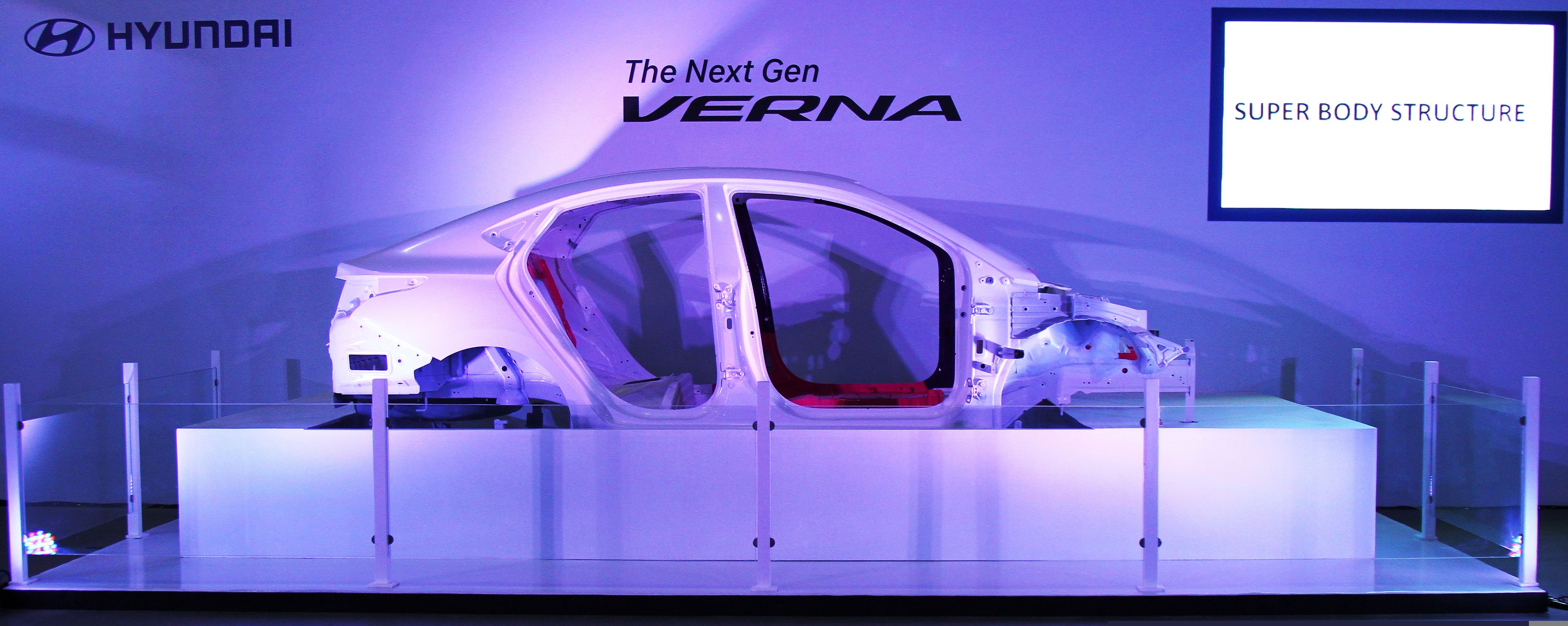Hyundai launches fifth-gen Verna, targets 12,000 sales by Diwali
Korean carmaker looks to convert 25 percent of the 45,000 consumer enquiries received after pre-booking commenced on August 1; 60 percent vote for diesel Verna and majority for auto transmission.
Nineteen days after it first revealed its all-new, fifth-generation Verna, Hyundai Motor India today launched the midsize sedan with prices starting at Rs 799,000 through to Rs 12.39 lakh (ex-showroom, Delhi), powered by 1.6-litre petrol and diesel engines and in four variants – E, EX, SX and SX(O).
The company, which says these are introductory prices for the first 20,000 bookings, has thus far received 45,000 enquiries after pre-bookings commenced on August 1. It plans to convert around 25 percent of those and sell around 10,000-12,000 units by the festive season of Diwali, which is mid-October.
While the sales plan for the new Verna is to achieve average monthly sales of 4,000-5,000 units, reaching the 20,000 mark with the launch prices by the end of CY2017, any external factors like government raising the cess on large cars would imply the company transferring the price rise to the consumer’s wallet. Hyundai Motor India says it is witnessing a 60 percent skew towards the diesel option, with the majority of customers preferring the automatic transmission in pre-bookings.
The new Verna is available with the existing 1.6-litre petrol and diesel engines. The 1.6-litre petrol engine, which develops 123hp and 151Nm of torque, and the 1.6-litre diesel, producing 128hp and 260Nm of torque, get six-speed manual transmissions with an optional six-speed automatic on offer. Hyundai claims improved fuel efficiency figures for all engine and transmission options.
Speaking at the launch of the new Verna today in New Delhi, Y K Koo, MD and CEO, Hyundai Motor India said, “ The next-gen Verna is engineered to deliver excellence in all core areas of styling, performance, technology, safety and ride and handling, creating a new benchmark in the sedan segment.”

Hyundai has used larger amounts of advanced high-strength steel (54.5 percent compared with 41.5 percent in the outgoing model) in the new Verna, resulting in a 32 percent increase in torsional rigidity. Along with the wider stance and longer wheelbase, this should help the Verna handle better. The Korean brand has claimed that efforts have been made to improve the steering feel as well.
The new Verna is underpinned by the Korean manufacturer’s K2 platform that is more rigid than the previous-gen model’s platform and also spawns the bigger Elantra sibling. Better NVH levels, crashworthiness and overall stiffness are the claimed improvements over the last-gen model. The new midsize sedan also gets a retuned suspension and steering setup that is meant to significantly improve the handling and ride quality compared to the previous car.
The all-new Verna is 65mm longer, 29mm wider and has a wheelbase that is 30mm longer than the previous-gen model. It is now 4,440mm long, 1,729mm wide, 1,475mm tall, and has a wheelbase of 2,600mm. Rear headroom has also increased to 948mm while the boot space and fuel tank capacity are up 480 litres and 45 litres, respectively. In terms of goodies and technology, the Verna is now at a par with its rivals but also offers a segment-first, cooled and ventilated front seats.
The fifth-gen Verna rivals the likes of the Honda City (Rs 8.46 lakh to Rs 13.43 lakh), Maruti Ciaz (Rs 7.66 lakh to Rs 11.44 lakh), Skoda Rapid Rs 8.20 lakh to Rs 13.06 lakh) and Volkswagen Vento (Rs 8.05 lakh to Rs 13.78 lakh) in the Indian market (all prices ex-showroom, Delhi). At this price point, the base petrol undercuts the Volkswagen Vento, Skoda Rapid and Honda City by a decent margin.
Eyeing export of 80,000 Vernas with 1.4 diesel engine
While Hyundai has brought in the fifth-generation Verna only with the 1.6-litre petrol and diesel engine options at the moment, it also foresees exports of an additional 80,000 units with the 1.4-litre engines from the same Gamma petrol and U2 diesel engine families and could bring in these options to be offered in the domestic market too.
With the government's high cess on hybrid cars under the GST regime, the company has shelved its plans to showcase its Ioniq range at the 2018 Auto Expo to be held in February next year. Instead, according to YK Koo, managing director, Hyundai Motor India, "Hyundai will now focus on strongly developing EV technology and bring those cars to India in line with the government's vision."
The company also plans to bring in a family oriented compact car model, equipped with a locally sourced AMT by H2 of CY2018, followed by a compact crossover in CY2019.
RELATED ARTICLES
Bajaj Auto launches new Chetak 3503 at Rs 110,000
The Chetak 3503, with a claimed range of 155km, 63kph top speed and a slower charging time than its 35 Series siblings, ...
Hyundai walks the eco talk with biogas plant, material recovery plant in Gurugram
Operational since October 2022, the facility targets sustainable waste management in Gurugram by undertaking scientific ...
Rajiv Bajaj reappointed MD and CEO of Bajaj Auto for five-year term
Bajaj Auto’s Board of Directors has approved the re-appointment of Rajiv Bajaj as the company’s MD and CEO for another f...






 22 Aug 2017
22 Aug 2017
 8576 Views
8576 Views




















 Autocar Professional Bureau
Autocar Professional Bureau




